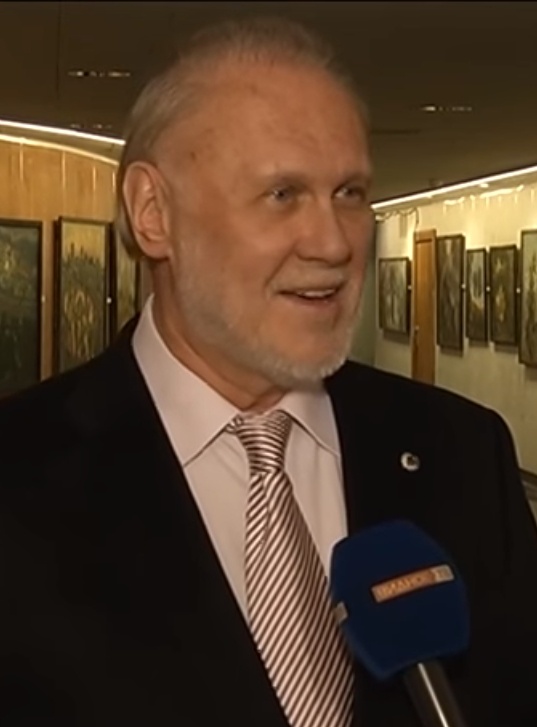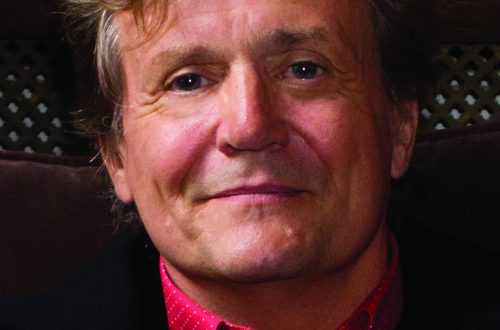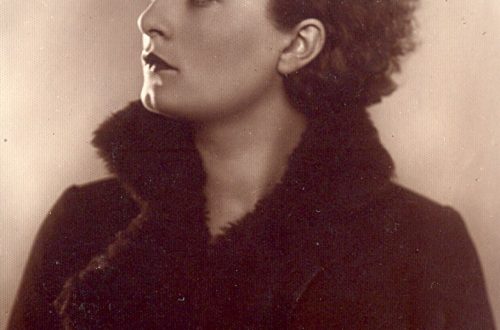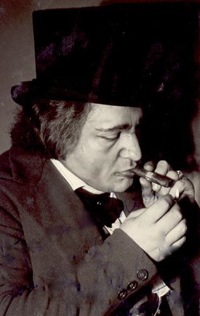
Sergei Petrovich Leiferkus |
Sergei Leiferkus
People’s Artist of the RSFSR, laureate of the State Prize of the USSR, laureate of All-Union and international competitions.
Born April 4, 1946 in Leningrad. Father – Krishtab Petr Yakovlevich (1920-1947). Mother – Leiferkus Galina Borisovna (1925-2001). Wife – Leiferkus Vera Evgenievna. Son – Leiferkus Yan Sergeevich, Doctor of Technical Sciences.
The Leiferkus family lived on Vasilyevsky Island in Leningrad. Their ancestors came from Mannheim (Germany) and even before the First World War they moved to St. Petersburg. All the men in the family were naval officers. Following the family tradition, Leiferkus, after graduating from the 4th grade of high school, went to take exams at the Leningrad Nakhimov School. But he was not accepted due to poor eyesight.
Around the same time, Sergei received a violin as a gift – this is how his musical studies began.
Leiferkus still believes that fate is the people who surround a person and lead him through life. At the age of 17, he got into the choir of the Leningrad State University, to the wonderful choirmaster G.M. Sandler. According to the official status, the choir was a student choir, but the professionalism of the team was so high that it could handle any job, even the most difficult things. At that time it was not yet “recommended” to sing liturgies and sacred music by Russian composers, but such a work as Orff’s “Carmina Burana” was performed without any prohibition and with great success. Sandler listened to Sergei and assigned him to the second basses, but just a couple of months later he transferred him to the first basses … At that time, Leiferkus’s voice was much lower, and, as you know, there are no baritones in the choral score.
In the same place, Sergei met the outstanding teacher Maria Mikhailovna Matveeva, who taught Sofia Preobrazhenskaya, People’s Artist of the USSR Lyudmila Filatova, People’s Artist of the USSR Yevgeny Nesterenko. Very soon Sergei became a soloist of the choir, and already in 1964 he took part in a tour of Finland.
In the summer of 1965, entrance exams to the conservatory began. Sergei performed the aria “Don Juan” and at the same time frantically waved his arms. Dean of the Vocal Faculty A.S. Bubelnikov uttered the decisive phrase: “Do you know, there is something in this boy.” Thus, Leiferkus was admitted to the preparatory department of the Leningrad Rimsky-Korsakov Conservatory. And study began – two years of preparatory, then five years of basic. They paid a small stipend, and Sergey went to work in Mimans. He entered the staff of the Maly Opera Theater and at the same time worked part-time at the mimamse in the Kirov. Almost all the evenings were busy – Leiferkus could be seen standing with a pipe in the extras in “Swan Lake” before the exit of Rothbart or in backup dancers in “Fadette” at the Maly Opera. It was an interesting and lively work, for which they paid, albeit small, but still money.
Then the opera studio of the conservatory was added, which opened in the year of his admission. At the opera studio, Leiferkus first, like all students, sang in the choir, then comes the turn of small roles: Zaretsky and Rotny in Eugene Onegin, Morales and Dancairo in Carmen. Sometimes he played both roles in the same play. But he gradually went “upstairs”, and sang two large parts – first Onegin, then the Viceroy in Offenbach’s operetta Pericola.
The famous singer always recalls with joy the years of study at the conservatory, with which many unique impressions are associated, and sincerely believes that he and his friends were taught by phenomenal teachers. Students are extremely lucky to have acting professors. For two years they were taught by Georgy Nikolaevich Guryev, a former student of Stanislavsky. Then the students did not yet understand their luck, and classes with Guryev seemed impossibly boring to them. Only now Sergey Petrovich began to realize how great a teacher he was – he had the patience to instill in students the correct feeling of his own body.
When Guryev retired, he was replaced by the greatest master Alexei Nikolaevich Kireev. Unfortunately, he died very early. Kireev was the type of teacher to whom one could come for advice and receive support. He was always ready to help if something did not work out, analyzed in detail, spoke out all the shortcomings, and gradually the students came to excellent results. Sergei Leiferkus is proud that in his 3rd year he received an annual grade of five plus from Kireev.
Among the works of the Conservatory, Leiferkus remembered the part of Sganarelle in Gounod’s opera The Doctor Against His Will. It was a sensational student performance. Of course, the French opera was sung in Russian. Students practically did not learn foreign languages, because they were sure that they would never have to sing in Italian, French or German in their lives. Sergey had to fill these gaps much later.
In February 1970, a 3rd year student Leiferkus was offered to become a soloist with the Leningrad Theater of Musical Comedy. Naturally, no other plans, except for a firm intention to become an opera singer, appeared in Sergey’s head, but nevertheless he accepted the offer, since he considered this theater a good stage school. At the audition, he performed several arias and romances, and when he was offered to sing something else lighter, he thought for a minute … And he sang the popular song “The Lame King” from the repertoire of Vadim Mulerman, for which he himself came up with a special gait. After this performance, Sergei became a soloist of the theater.
Leiferkus was very lucky with vocal teachers. One of them was a brilliant teacher-methodologist Yuri Alexandrovich Barsov, head of the vocal department at the conservatory. Another was the leading baritone of the Maly Opera Theater Sergei Nikolaevich Shaposhnikov. In the fate of the future opera star, classes with him played a huge role. It was this teacher and professional singer who helped Sergei Leiferkus understand what the interpretation of a particular chamber composition is. He greatly helped the novice singer in his work on the phrasing, text, idea and thought of the work, gave invaluable advice on vocal technology, especially when Leiferkus was working on competitive programs. Preparation for competitions helped the singer grow as a chamber performer and determined his formation as a concert singer. Leiferkus’s repertoire has preserved many works from various competition programs, to which he returns with pleasure even now.
The first competition in which Sergei Leiferkus performed was the V All-Union Glinka Competition in Viljus in 1971. When the student came to Shaposhnikov’s house and said that he had chosen Mahler’s “Songs of a Wandering Apprentice”, the teacher did not approve of the choice, because he believed that Sergei was still young for this. Shaposhnikov was sure that life experience, endured suffering, which must be felt with the heart, is necessary for the fulfillment of this cycle. Therefore, the teacher expressed the opinion that Leiferkus would be able to sing it in thirty years, not earlier. But the young singer has already “fell ill” with this music.
At the competition, Sergei Leiferkus received the third prize in the chamber section (this is despite the fact that the first two were not awarded to anyone at all). And initially he went there as a “spare”, because he worked in the theater of the Musical Comedy, and this left a certain imprint on the attitude towards him. Only at the very last moment they decided to include Sergei as the main participant.
When Leiferkus returned home after the competition, Shaposhnikov, congratulating him, said: “Now we will begin real work on Mahler.” Kurt Mazur, who came to Leningrad to conduct the Mravinsky Orchestra, invited Sergei to sing at the Philharmonic nothing but Songs. Then Mazur said that Sergei is very good at this cycle. From a German conductor and musician of this class, this was a very big praise.
In 1972, 5th year student S. Leiferkus was invited as a soloist to the Academic Maly Opera and Ballet Theatre, where over the next six years he performed more than 20 parts of world opera classics. At the same time, the singer tried his hand at competitions: third prizes were replaced by second ones, and, finally, the Grand Prix of the X International Vocal Competition in Paris and the prize of the Grand Opera Theater (1976).
Around the same time, a great creative friendship began with the composer D.B. Kabalevsky. For many years Leiferkus was the first performer of many works by Dmitry Borisovich. And the vocal cycle “Songs of a Sad Heart” was released with a dedication to the singer on the title page.
In 1977, the artistic director and chief conductor of the Academic Opera and Ballet Theater named after S.M. Kirov Yuri Temirkanov invited Sergei Leiferkus to stage productions of War and Peace (Andrey) and Dead Souls (Chichikov). At that time, Temirkanov created a new troupe. Following Leiferkus, Yuri Marusin, Valery Lebed, Tatyana Novikova, Evgenia Tselovalnik came to the theater. For almost 20 years, S.P. Leiferkus remained the leading baritone of the Kirov (now the Mariinsky) Theatre.
The richness of the voice and the exceptional acting talent of S.P. Leiferkus allow him to take part in a variety of opera productions, creating unforgettable stage images. His repertoire includes more than 40 opera parts, including Tchaikovsky’s Eugene Onegin, Prince Igor Borodina, Prokofiev’s Ruprecht (“The Fiery Angel”) and Prince Andrei (“War and Peace”), Mozart’s Don Giovanni and the Count (“The Marriage of Figaro”), Wagner’s Telramund (“Lohengrin”). The singer pays great attention to the stylistic and linguistic nuances of the performed works, embodying on stage the images of such diverse characters as Scarpia (“Tosca”), Gerard (“Andre Chenier”), Escamillo (“Carmen”), Zurga (“Pearl Seekers” ). A special layer of creativity S. Leiferkus – Verdi opera images: Iago (“Othello”), Macbeth, Simon Boccanegra, Nabucco, Amonasro (“Aida”), Renato (“Masquerade Ball”).
20 years of work on the stage of the Mariinsky Theater have borne fruit. This theater has always had the highest level of culture, the deepest traditions – musical, theatrical and human, long recognized as a standard.
In St. Petersburg, Sergei Leiferkus sang one of his crowning parts – Eugene Onegin. A stunning, pure performance, the music in which perfectly conveyed the feelings and moods of the characters. “Eugene Onegin” staged in the scenery of the main designer of the theater Igor Ivanov Yu.Kh. Temirkanov, acting simultaneously as a director and conductor. It was a sensation – for the first time in many years, a performance of the classical repertoire was awarded the State Prize of the USSR.
In 1983, the Wexford Opera Festival (Ireland) invited S. Leiferkus to perform the title role of the Marquis in Massenet’s Griselidis, followed by Marschner’s Hans Heiling, Humperdinck’s The Royal Children, Massenet’s The Juggler of Notre Dame.
In 1988, he made his debut at the London Royal Opera “Covent Garden” in the play “Il trovatore”, where the part of Manrico was performed by Placido Domingo. From this performance their creative friendship began.
In 1989, the singer was invited to take part in the production of The Queen of Spades at one of the prestigious music festivals – in Glyndebourne. Since then, Glyndebourne has become his favorite city.
From 1988 to the present, S.P. Leiferkus is a leading soloist with the Royal Opera of London and since 1992 with the New York Metropolitan Opera, regularly participates in productions of world famous European and American theaters, is a welcome guest on the stages of Japan, China, Australia and New Zealand. He gives recitals in prestigious concert halls in New York, London, Amsterdam, Vienna, Milan, takes part in festivals in Edinburgh, Salzburg, Glyndebourne, Tangelwood and Ravinia. The singer constantly performs with the Boston, New York, Montreal, Berlin, London Symphony Orchestras, collaborates with such outstanding contemporary conductors as Claudio Abbado, Zubin Mehta, Seiji Ozawa, Yuri Temirkanov, Valery Gergiev, Bernard Haitink, Neeme Järvi, Mstislav Rostropovich, Kurt Masur, James Levine.
Today, Leiferkus can safely be called a universal singer – there are no restrictions for him either in the operatic repertoire or in the chamber one. Perhaps, there is no second such “polyfunctional” baritone at the moment either in Russia or on the world opera stage. His name is inscribed in the history of world performing arts, and according to numerous audio and video recordings of Sergei Petrovich’s opera parts, young baritones learn to sing.
Despite being very busy, S.P. Leiferkus finds time to work with students. Repeated master classes at the Britten-Pearce School, in Houston, Boston, Moscow, Berlin and London’s Covent Garden – this is far from the full geography of his teaching activities.
Sergei Leiferkus is not only a brilliant singer, but also known for his dramatic talent. His acting skills are always noted not only by the audience, but also by critics, who, as a rule, are stingy with praise. But the main tool in creating the image is the singer’s voice, with a unique, unforgettable timbre, with which he can express any emotion, mood, movement of the soul. The singer leads the triumvirate of Russian baritones in the West in terms of seniority (besides him, there are Dmitry Hvorostovsky and Vladimir Chernov). Now his name does not leave the posters of the largest theaters and concert halls in the world: the Metropolitan Opera in New York and Covent Garden in London, Opera Bastille in Paris and Deutsche Oper in Berlin, La Scala , in the Vienna Staatsoper, the Colon Theater in Buenos Aires and many, many others.
In collaboration with the most famous companies, the singer has recorded more than 30 CDs. The recording of the first CD of Mussorgsky’s songs performed by him was nominated for a Grammy Award, and the recording of the complete collection of Mussorgsky’s songs (4 CDs) was awarded the Diapason D’or prize. The catalog of S. Leiferkus’ video recordings includes operas staged at the Mariinsky Theater (Eugene Onegin, The Fiery Angel) and Covent Garden (Prince Igor, Othello), three different versions of The Queen of Spades (Mariinsky Theatre, Vienna State Opera, Glyndebourne) and Nabucco (Bregenz Festival). The latest television productions with the participation of Sergei Leiferkus are Carmen and Samson and Delilah (Metropolitan Opera), The Miserly Knight (Glyndebourne), Parsifal (Gran Teatre del Licen, Barcelona).
S.P. Leiferkus – People’s Artist of the RSFSR (1983), laureate of the State Prize of the USSR (1985), laureate of the V All-Union Competition named after M.I. Glinka (1971), laureate of the International Vocal Competition in Belgrade (1973), laureate of the International Schuman Competition in Zwickau (1974), laureate of the International Vocal Competition in Paris (1976), laureate of the International Vocal Competition in Ostend (1980).
Source: biograph.ru





